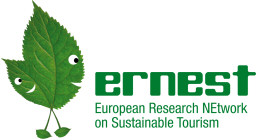
ERNEST Project
European Research NEtwork on Sustainable Tourism
In all the ERNEST partner regions, as in many others in Europe, tourism is (or is becoming) a fundamental economic sector but one which can put territory itself at risk. We are witnessing an evolution in the tourism market dominated on the one hand by a considerable growth in standardised costal resorts and, on the other, by the growth of destinations with a higher cultural or nature content. Policies for tourism development often do not take into consideration the principle of social and environmental sustainability and instead concentrate on short to medium term economic gain.
It is clear from the wide availability of literature on sustainable development and tourism, and from the numerous international initiatives and strategies identified to promote sustainable development in tourism, that research and innovation to promote sustainable tourism is an important, current theme.
At EU level immense consideration has been afforded to the theme as shown by the wealth of documents stressing the importance of sustainable tourism and providing ideas and input on how to achieve it. However, in Europe we have not yet managed to overcome the fragmentation of research activities which limits our potential for growth. The ERNEST project aims to use the ERA NET tool to address these issues.
Specific ERNEST research themes
The ERNEST project will promote research into addressing 10 pre-identified issues and is based on the concept of research on sustainable tourism having a "two pillar operative structure" of social dialogue and measurement which the project will share and develop among its partners.
These two pillars represent the basis on which further research activities on sustainable tourism can be based, by providing the conditions in which tourism-related research can match territorial needs and can be clearly measured and evaluated.
It is fundamental for the public administration to put in place models and platforms for all types of coordination and social dialogue.
ERNEST will help them to do some by promoting transnational exchange, collaboration and joint activities.
10 strategic research areas which fully highlight the horizontal nature of research into sustainable tourism have been identified for analysis during the ERNEST project and are as follows:
Impact of transport
Residents quality of life
Quality of work
Widening the relations between demand/offer (geographical and seasonal concentration of tourism)
Active conservation of cultural heritage
Active conservation of environmental heritage
Active conservation of distinctive identities of destinations
Reduction and optimisation of use of natural resources with particular reference to water
Reduction and optimisation of energy consumption
Reduction of waste and better waste management
In general terms, within these strategic research areas the ERNEST regions will concentrate on:
what exactly should be measured with the indicators in order to successfully evaluate tourism development in terms of sustainability;
what operative models are needed in these field (including whether the Balanced Scorecard approach can fit into this context);
how systems for revealing and correcting territorial characteristics can be activated;
how a common framework among regions can be identified, developed and implemented.
Want more info on how ERNEST project will develop? Go to the Action Plan section




